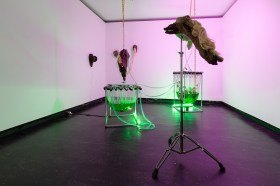While APRA reacts angrily to media coverage of its ACCC re-authorisation, new claims cast doubt on its distribution methods, writes Ben Eltham.
In 2011, I interviewed Justice Arthur Emmett of the Federal Court’s Copyright Tribunal.
Supremely courteous and effortlessly erudite, Emmett was nearing retirement after years of service. He gavelled some of the most controversial cases in Australia’s fierce copyright wars, including the grandaddy of them all, Roadshow Films versus iiNet, a kind of omnibus piracy suit that spent years in the Federal Court. Brought by a consortium of big Hollywood studios, record labels and television networks, the case became a crucial test of whether an internet service provider was responsible for the rampant illegal downloading of its users.
In our interview, Emmett and I discussed the origins and nature of copyright. ‘The notion of the Copyright Tribunal,’ Emmett explained with jurisprudential magnificence, ‘is in effect to fix the price for what are in effect compulsory licences. The Copyright Act creates a monopoly in relation to copyrighted material, and people are therefore in a position to say “I’ll charge whatever I like for my copyrighted material”.’
This is the nub of the micro-controversy that has blown up between music collection agency APRA and the federal’s government consumer watchdog. As we reported here at ArtsHub last Friday, APRA, which exists to levy royalties on music copyrights, is currently in the process of applying for ‘authorisation’ from the ACCC. That’s re-opened the ever-wriggling can of worms that is copyright.
APRA wasn’t too happy with the article. In response, APRA’s Brett Cottle called my piece an ‘attack’ that ‘made no apparent effort to check facts or understand issues.’
Ben Eltham’s statement that ‘collection agencies have a unique exemption under Australian corporate law’ is a nonsense. If there were such an exemption, there would be no need to engage in the authorisation process.
[…]
Copyright law is not as “fiendishly complex” as Mr Eltham makes out. Its basic premise is simple: without copyright, there would be no money for Australian creators. Australian copyright law, and APRA’s system of collective management, give songwriters the ability to earn a living from selling their music.
How simple is copyright law, really? And what is the legal basis for APRA’s monopoly? ArtsHub sought the opinions of two respected Australian legal scholars in response to Brett Cottle and APRA. It turns out that APRA’s legal status is pretty complex after all.
According to the University of Sydney’s Kimberlee Weatherall, APRA does indeed have an exemption from Australian competition law.
‘The ACCC has the power, under the Competition and Consumer Act 2010 (Cth), to grant authorisations which grant immunity for potential breaches of the competition provisions of the Act,’ Weatherall wrote in an email. ‘This is the provision under which APRA applies for authorisation, because without such authorisation, elements of APRA’s Articles and Rules would likely breach competition law.’
Associate Professor Weatherall noted that in its 2010 authorisation of APRA, the ACCC explained why. ‘Basically,’ she wrote, ‘composers, who might otherwise be competitors, might be agreeing among themselves and through the collecting society to prevent, restrict or limit supply.’
But, she added, APRA’s exemption is not unique. ‘[APRA] operates in a way that might breach competition law, but, in common with other organisations, is entitled to (and has) applied for authorisation for its operations as a collecting society on the basis that the public benefits outweigh the public detriments,’ she explained.
Nic Suzor, a senior lecturer in the Queensland University of Technology’s Law School, said that ‘currently APRA has a monopoly over the right to collect for various uses of written music.’
‘The general presumption in our law is that we really don’t like monopolies, because we think its bad for competition and therefore bad for consumers,’ Suzor said in a phone interview. ‘The exemption process – and I’m not a competition lawyer – comes up where entities apply to the ACCC for permission where they might otherwise run afoul of the prohibitions on certain monopolies.’
The APRA story is newsworthy because of this monopoly. Collection agencies are assuming a central role in the digital economy. While APRA — and the big multinational record labels that it distributes significant royalties to — are still the 900-pound gorillas of the Australian music industry, the process of re-authorisation has encouraged some of the other players in the industry to have their say.
QUT’s Nic Suzor thinks that the rapid evolution of the industry is driving this conflict.
‘People are arguing that they can increasingly deal directly with the artists, or the owners of individual copyrights, or smaller entities like record labels, in securing the rights for public performance,’ he said. ‘They think particularly that they don’t need to use the one-stop shop that APRA provides anymore.’
Suzor added that some artists also have legitimate questions about APRA’s practices. ‘One of the things that concerns me about APRA’s monopoly is that it’s really hard for artists to manage their own copyrights,’ he said, observing that APRA’s license-back facilities are quite difficult to organise. ‘When you sign up to APRA, you assign your copyrights to APRA and that means that APRA then becomes the owner of those rights. If an artist wants to release a song under a Creative Commons license, they can’t do that and still ask APRA to collect royalties for commercial uses.’
‘APRA’s monopoly position limits innovation in how Australian musicians can choose to make their music available online,’ he says.
APRA’s Brett Cottle argues that the agency’s licensees and members are generally happy. But some clearly aren’t, as a glance through the ACCC submissions shows. While a little grumbling is to be expected in any industry, the complaints are helping to shine a light on the bewildering complexity and opacity of some of APRA’s business practices.
Take Appendix 4 from APRA’s own submission to the ACCC, tabled on the 28th June. It lists APRA’s various license fees for the public performance of music. The schedule runs to six small-typed pages. There are no fewer than 135 different tariffs, including special rates for cruise ships, karaoke bars, gym classes and dance schools. There are 15 different tariffs for background music in fitness centres, and 27 different rates for shops. Eisteddfods and the Gymnastics Federation get their own special rates. It’s not difficult to se how this could be confusing for licensees.
Some of APRA’s members are confused, too. A submission tabled this week emanates from a group of Australian DJs and electronic musicians. It makes a series of detailed observations about apparent inconsistencies in APRA’s licensing practices for nightclubs. In particular, the submission questions APRA’s newly-installed DJ monitors, which will attempt to digitally log DJ playlists in APRA-licensed nightclubs.
APRA is currently calculating more than 80 per cent of its nightclub royalties using the new DJ monitors, despite admitting that only eight have been installed around the country. The submission points out that there are 747 nightclubs in APRA’s system, so any royalties calculated using these eight units represents barely more than 1 per cent of plays. ‘We do not believe that this is a big enough sample to use as a “principle basis for distribution”,’ the DJs write.
The Australian Digital Alliance‘s Ellen Broad shares these concerns. She told ArtsHub that ‘there should be more transparency’ in the way ARPA’s royalties are calculated and distributed.
‘If artists are getting less than 100 per cent, why is that happening?’ she asked. ‘In the digital age, where direct licensing is now achievable, and we have things like the digital copyright exchange in the UK, are artists getting the maximum return from a system like APRA’s?’
None of this means APRA is acting improperly. But it does show that some of its members and customers are concerned about its conduct. APRA should welcome the current debate as an opportunity to address these concerns.





